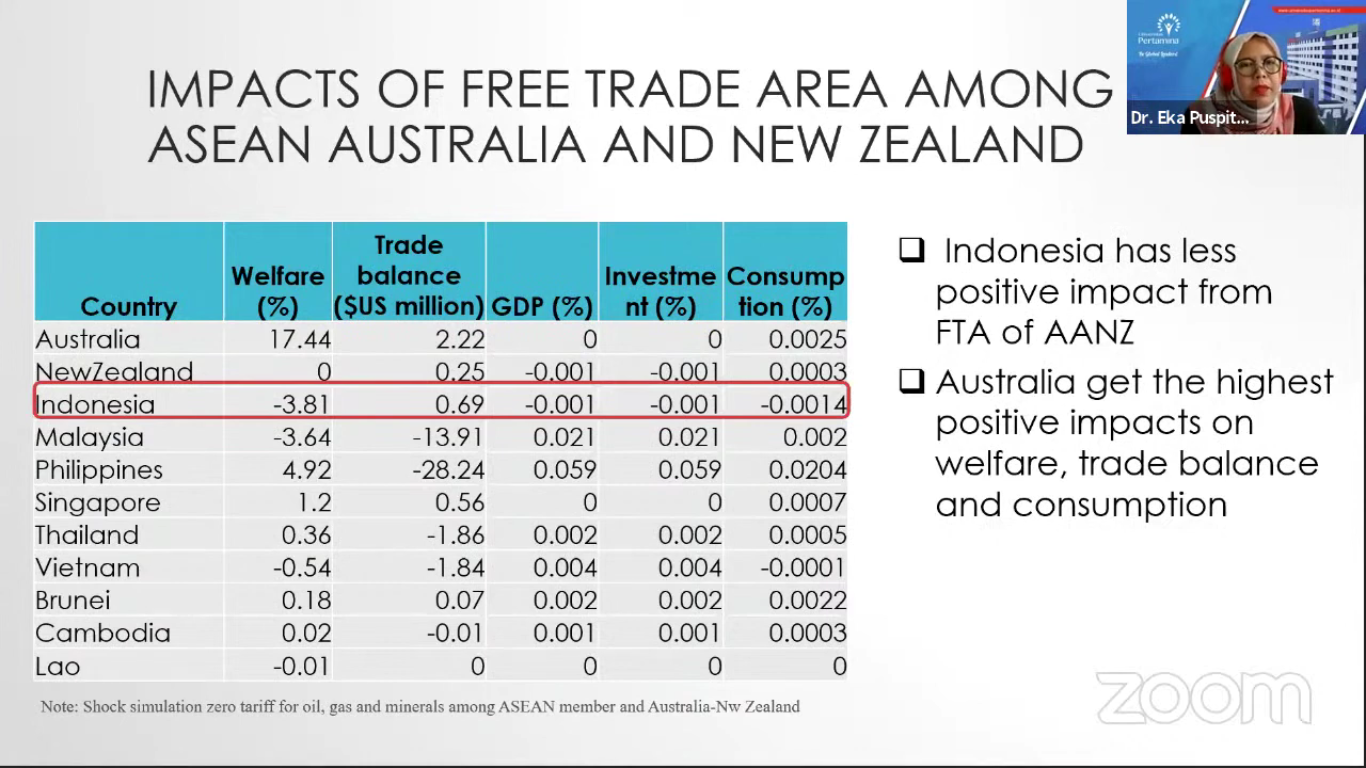
Online, 26 Oct 2021
In advancing ASEAN Researchers Network on Energy and Climate Change (ARNECC), ASEAN Climate Change and Energy Project (ACCEPT) held the 8th ARNECC Paper Talks on 26 October 2021. The event discussed about an article entitled “Does Indonesia gain from ASEAN-ANZ FTA (AANZFTA)? A Trade Analysis of Oil, Gas and Mining Products”, which presented by the lead author, Dr Eka Puspitawati, and reviewed by the Energy Economist of ERIA, Dr Alloysius Joko Purwanto. The event was moderated by ACCEPT Research Analyst, Ms. Monika Merdekawati.
The ASEAN-Australia-New Zealand Free Trade Area (AANZFTA) was established in 2010 aiming to strengthen and enhance economic cooperation, trade in goods and services and investment between countries. The FTA should have increased welfare of traded countries in which export is expected to rise. However, Indonesian import of goods and services from ASEAN and ANZ exceeded the export values in 2010-2015.
Metals are the main exported products from Indonesia to Australia. The main imported product from Australia to Indonesia is coal, however, it is also the main exported product from Indonesia to New Zealand. Whereas in ASEAN, the main imported products from Australia are oils, but it is also the main exported products to NZ. Commodities of oil, gas, and mining are leading with high competitiveness in the AANZ market and it tends to increase for only natural gas. The trade performance in Indonesian commodities shows a high competitiveness in oil, gas, and mining before and after the implementation of AANZFTA particularly on natural gas, petroleum oil, coal, and tin.
Further analysis indicates that Indonesia has the potential to boost the export of natural gas as it has higher competitiveness value. While for other commodities, they tend to decrease because of lack of improvement on its technology and related capacity. In addition, compared to Australia, New Zealand, and ASEAN countries, Indonesia received fewer positive impacts from AANZFTA, whereas Australia benefitted the most on welfare, trade balance, and consumption.

Presentation by Dr. Eka Puspitawati
The study suggested Indonesian decision makers to seek and develop potential products that have high added values and competitiveness to leverage the ASEAN-ANZ scheme. Moreover, Indonesia can apply various trade partnership in order to maximise benefit of AANZFTA.
Dr. Joko suggested that there should be a framework applied to consider sustainability aspects such as domestic stock or consumption to predict future needs. He also added to the conclusion to focus on renewable based energy export commodities such as Crude Palm Oil (CPO). However, since the European Union (EU) will be possible to completely banning CPO from Indonesia towards 2030, Indonesia is expected to increase CPO products such as biodiesels for domestic use, for example in aviation. Dr. Eka mentioned that to predict the future needs, dynamic model is needed. In terms of increase in domestic use of CPO, it will also enhance the development of renewables. In addition, since FTA requires certain standards and procedures, it is more likely that Indonesia will welcome more investments on clean energy such as Clean Coal Technologies (CCTs).
Ms. Monika closed the event by promoting ARNECC which provides interdisciplinary forum for the discussion of social, economic, governance and technical issues related to energy and/or climate change. Therefore, not only it will enhance the coherence between the ASEAN energy and climate policies, it will also contribute to more climate-friendly development of the energy sector.
(SNF).